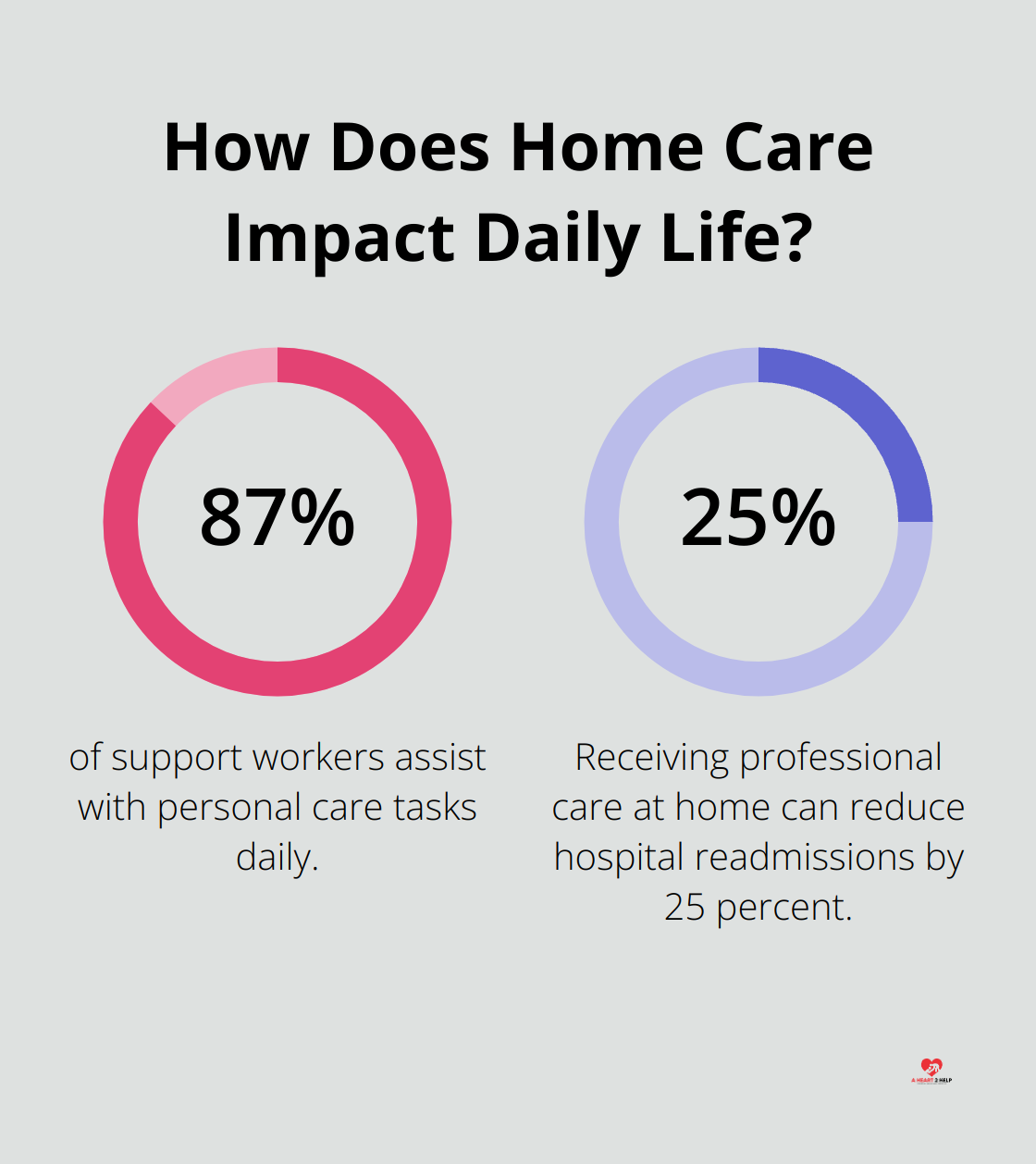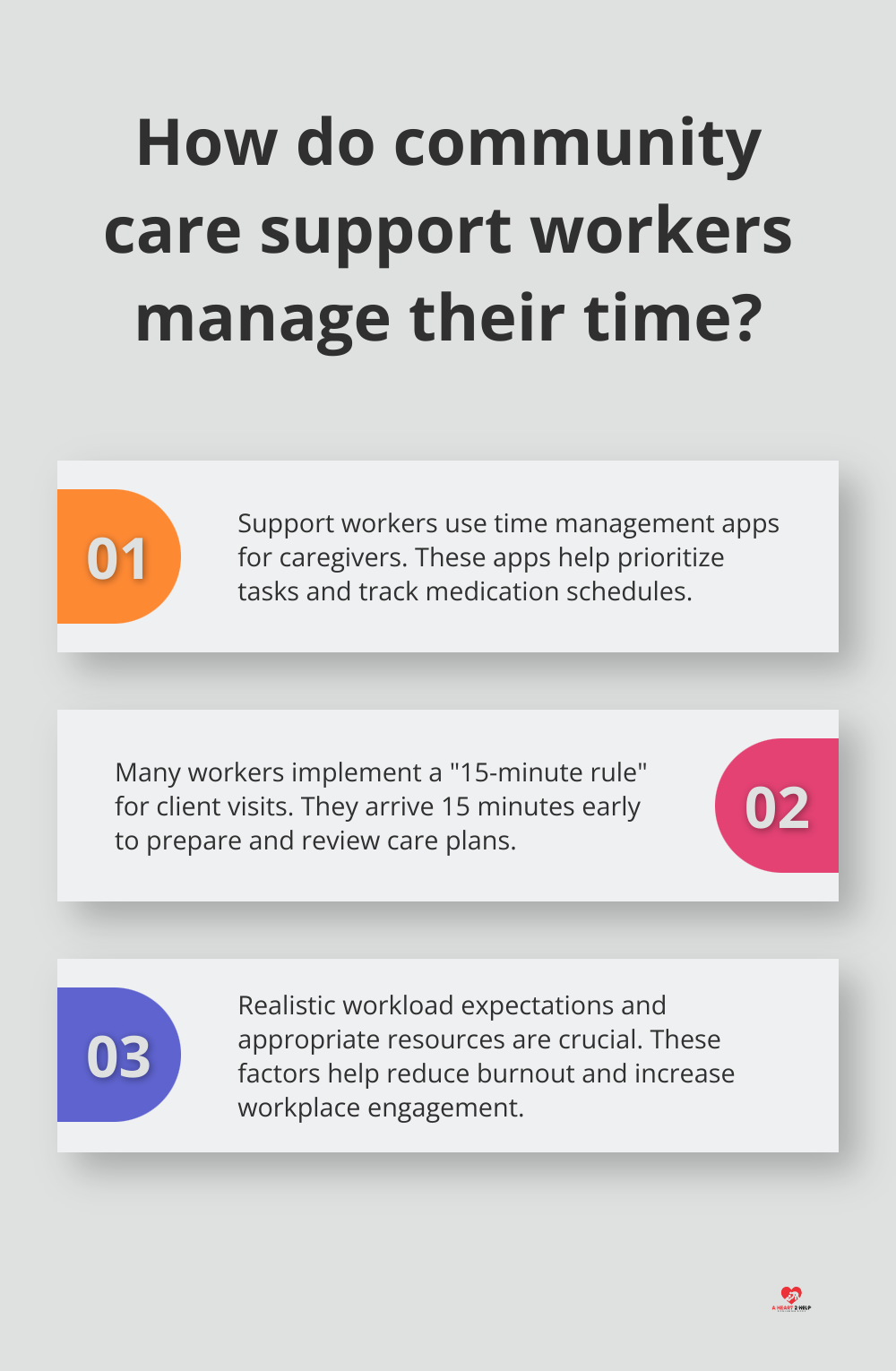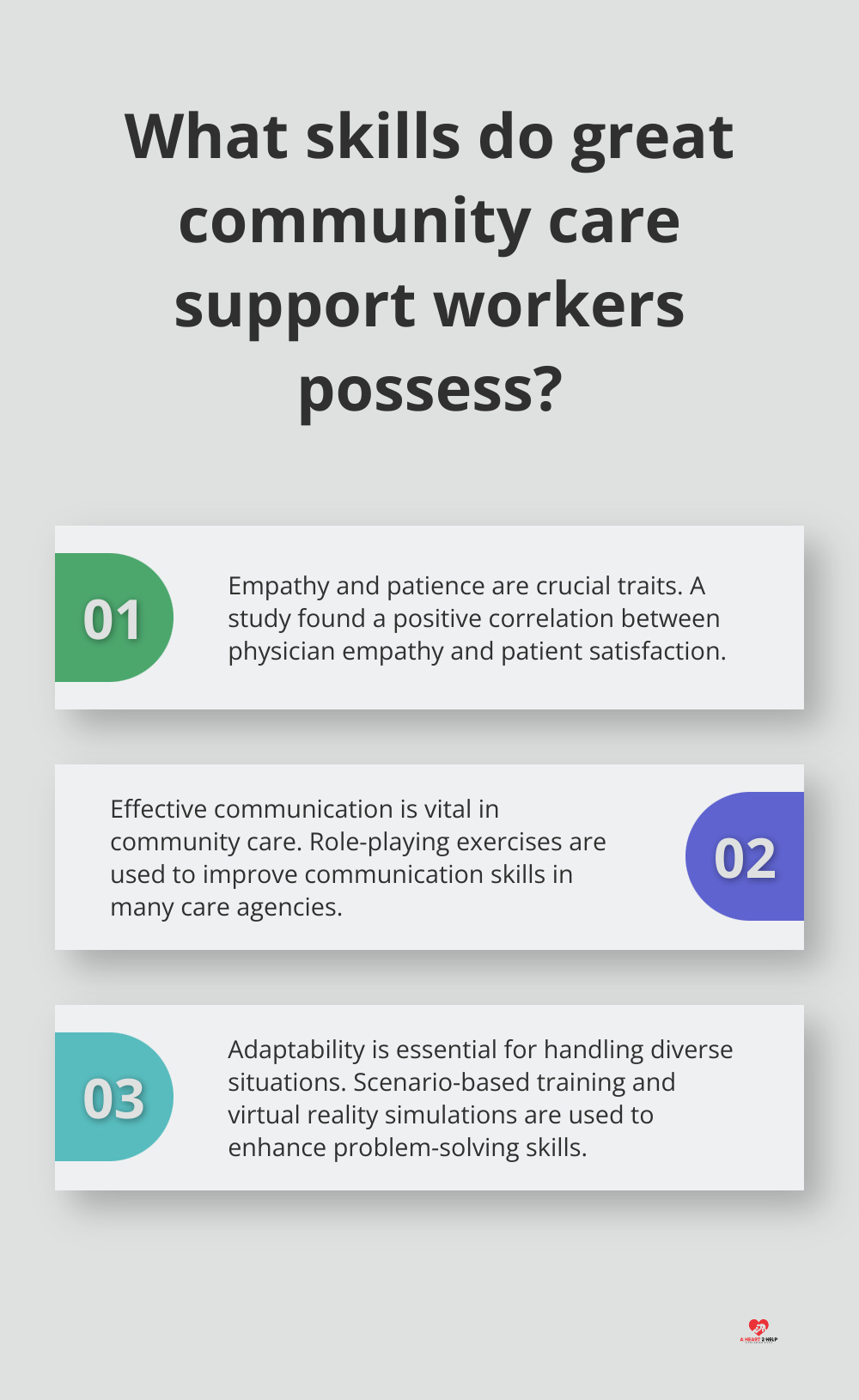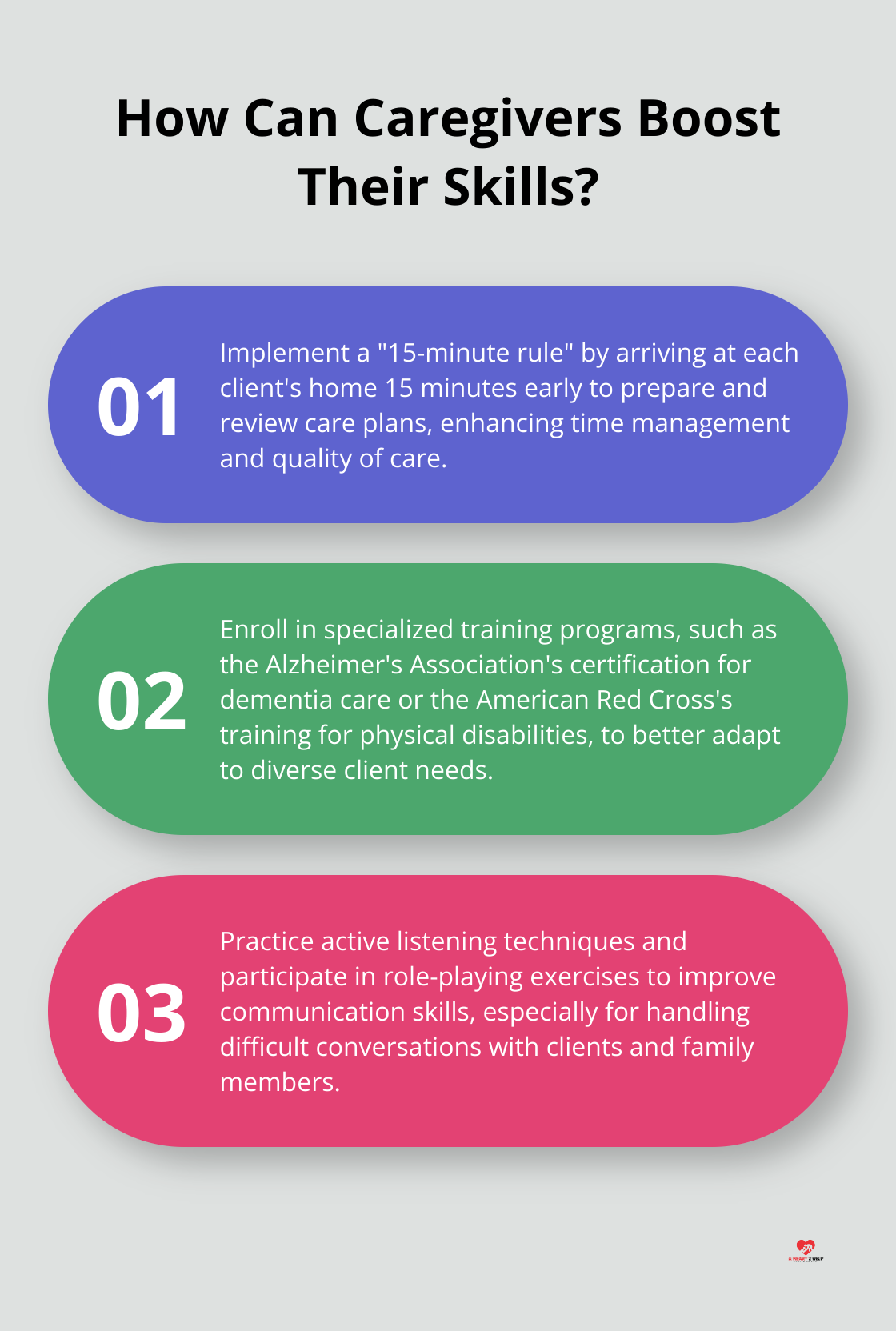Community care support workers are the unsung heroes of our healthcare system. They provide essential assistance to those who need it most, often working tirelessly behind the scenes.
At A Heart 2 Help, we recognize the immense value these professionals bring to our communities. In this post, we’ll explore a day in the life of a community care support worker, shedding light on their roles, challenges, and the skills that make them indispensable.
What Does a Community Care Support Worker Do?
Community care support workers form the backbone of our healthcare system. They provide essential services that enhance the quality of life for those in need. Their responsibilities are diverse and demanding, requiring a unique blend of skills and compassion.
Personal Care and Daily Living Assistance
The core of a community care support worker’s role involves providing personal care. This includes helping clients with bathing, dressing, and grooming. A 2023 survey by the National Association of Care Workers reveals that 87% of support workers assist with these tasks daily. They also help with meal preparation, light housekeeping, and laundry, which ensures clients maintain a clean and comfortable living environment.
Health Monitoring and Medication Management
Community care support workers play a vital role in monitoring clients’ health. They often take vital signs (such as blood pressure and temperature) and report any changes to healthcare professionals. A study found that receiving professional care at home can reduce hospital readmissions by as much as 25 percent.

Medication management is another critical responsibility. Workers ensure clients take the right medications at the correct times, which can save lives. They must remain vigilant about potential side effects and interactions, acting as an essential link between clients and their healthcare providers.
Emotional Support and Social Engagement
One of the most undervalued aspects of a community care support worker’s job involves providing emotional support and companionship. Many clients (especially older adults) face social isolation. Research shows that loneliness and social isolation are as dangerous to health as smoking and obesity, and are an important risk factor for Alzheimer’s disease and major depression.
Support workers engage clients in conversations, activities, and hobbies. They might play games, read books aloud, or simply listen to their clients’ stories. This social engagement is essential for maintaining cognitive function and emotional well-being.
The Multifaceted Nature of Care Work
Community care support workers are more than just caregivers; they’re lifelines for many individuals. Their role requires dedication, empathy, and a wide range of skills. As we explore their day-to-day experiences further, we’ll gain a deeper appreciation for the challenges they face and the qualities that make them indispensable to our communities.
In the next section, we’ll examine the specific challenges that community care support workers encounter in their daily work, shedding light on the resilience and adaptability required in this demanding profession.
The Hidden Struggles of Community Care Support Workers
Time Management in a High-Pressure Environment
Community care support workers face numerous challenges that often fly under the radar. One of the most pressing issues is effective time management in a fast-paced setting. Realistic workload and expectations with appropriate resources and training are crucial in reducing burnout and increasing engagement in the workplace.

Many support workers combat this issue with time management apps designed specifically for caregivers. These tools help them prioritize tasks, track medication schedules, and manage client appointments efficiently. Some workers also implement a “15-minute rule,” arriving at each client’s home 15 minutes early to prepare and review care plans.
Emotional Toll and Burnout Prevention
The emotional demands of care work can overwhelm even the most dedicated professionals. These effects at work frequently have repercussions on personal life such as feeling unhappy, anxiety, depression, isolation, and substance abuse.
To address this issue, many organizations now implement mandatory self-care programs for their staff. These programs include access to counseling services, stress management workshops, and regular check-ins with supervisors. Some agencies have also introduced “buddy systems,” pairing experienced workers with newcomers to provide emotional support and guidance.
Adapting to Diverse Client Needs
Every client has unique needs, preferences, and personalities. A community care support worker might assist an elderly person with dementia in the morning and then work with a young adult with physical disabilities in the afternoon. This constant adaptation can be mentally and emotionally taxing.
To tackle this challenge, many support workers turn to specialized training programs. For example, the Alzheimer’s Association offers a certification program specifically for caregivers working with dementia patients. Similarly, organizations like the American Red Cross provide training on caring for individuals with various physical disabilities.
Navigating Complex Family Dynamics
Community care support workers often find themselves in the middle of complex family situations. They must balance the needs and wishes of their clients with the expectations and concerns of family members. This can lead to challenging conversations and potential conflicts.
To navigate these situations effectively, many support workers receive training in conflict resolution and family communication. They learn techniques to mediate disagreements, set clear boundaries, and involve family members in care decisions when appropriate.
Physical Demands and Safety Concerns
The physical nature of care work can take a toll on support workers’ bodies. Lifting and transferring clients, assisting with mobility, and performing household tasks can lead to strain and injury if not done properly.
To address these concerns, many care agencies (including A Heart 2 Help) provide ergonomic training and equipment to their workers. They also implement safety protocols to protect workers from potential hazards in clients’ homes.
As we explore the skills and qualities needed for success in this field, we’ll see how community care support workers overcome these challenges to provide exceptional care to their clients.
What Makes a Great Community Care Support Worker?
The Power of Empathy and Patience
Empathy and patience are essential traits for community care support workers. These qualities enable them to connect with clients on a deeper level, understanding their needs and concerns. A study found that there is a good correlation between physician empathy and patient satisfaction, with a direct positive relationship to strengthening patient enablement.

To cultivate empathy, many support workers use active listening techniques. This approach involves giving clients full attention, acknowledging their feelings, and responding thoughtfully. Some organizations offer empathy training programs to enhance empathy among healthcare professionals.
Communication: The Bridge to Better Care
Effective communication is vital in community care. Support workers must clearly convey information to clients, family members, and healthcare professionals. They also need to excel at non-verbal communication, as many clients may struggle to express themselves verbally.
One practical way to improve communication skills is through role-playing exercises. Many care agencies incorporate these into their training programs, allowing support workers to practice handling difficult conversations in a safe environment. Additionally, learning basic sign language or key phrases in a client’s native language can significantly enhance communication and build trust.
Adaptability: Handling Diverse Situations
No two days are the same in community care, and support workers must prepare to adapt to changing circumstances. This might involve adjusting care plans on the fly, addressing unexpected health issues, or managing family conflicts.
To enhance adaptability, many support workers participate in scenario-based training. This method presents workers with various challenging situations and asks them to develop solutions. Some organizations use virtual reality simulations to create realistic scenarios, allowing workers to practice their problem-solving skills in a controlled environment.
Physical and Emotional Resilience
The physical demands of care work are significant. Support workers often assist with mobility, perform household tasks, and sometimes lift or transfer clients. Equally important is emotional resilience, as workers frequently deal with stressful situations and emotional clients.
To maintain physical health, many support workers follow specific exercise regimens designed for caregivers (often focusing on core strength and proper lifting techniques). For emotional resilience, mindfulness practices have shown promising results. A study suggested that Mindfulness-Based Stress Reduction (MBSR) was effective in reducing healthcare professionals’ experiences of anxiety, depression, and stress.
Health and Safety Expertise
Knowledge of health and safety protocols is critical for protecting both clients and workers. This includes understanding infection control procedures, recognizing signs of health deterioration, and knowing how to respond in emergencies.
Many care agencies require their workers to complete regular health and safety training. This often includes CPR and first aid certification, as well as specific training on common health conditions among their client base. Some organizations have implemented mobile apps that provide quick access to health and safety guidelines (ensuring workers always have this important information at their fingertips).
Final Thoughts
Community care support workers form the backbone of our healthcare system. They provide essential services that enhance the quality of life for countless individuals. Their roles demand a unique blend of skills, compassion, and resilience as they touch lives in profound ways every day.

These dedicated professionals face significant challenges in their work. They navigate complex family dynamics, manage time effectively in high-pressure environments, and adapt to diverse client needs. Despite these obstacles, community care support workers continue to provide exceptional care, driven by their commitment to improving the lives of others.
A Heart 2 Help commits to enhancing community care efforts through our innovative care-app. We connect compassionate individuals with those in need, promoting a sense of community and support. Our goal is to make volunteering more accessible and encourage acts of kindness, ultimately building stronger community bonds and creating lasting, impactful change.
